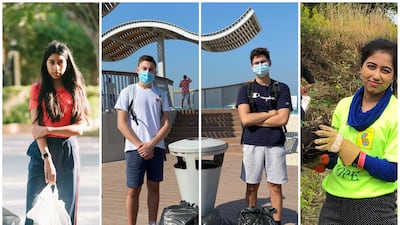“We don’t inherit the Earth from our ancestors, we borrow it from our children,” goes the oft-heard quote. And it speaks volumes when the next generation is already greatly concerned about the state of the planet they will be inheriting.
According to a September 2021 study led by the University of Bath in England, which canvassed the views of 10,000 young people, more than 50 per cent are “extremely anxious about climate change”. The survey polled youths from Australia, Brazil, Finland, France, India, Nigeria, Portugal, the Philippines, the US and the UK, but the findings hold true closer to home as well.
In June, a study for Cartoon Network revealed climate change is a key concern for children across Europe, Middle East and Africa. The study analysed the views and behaviours of those between 6 and 12 years in 13 countries, including the UAE, and found 91 per cent were concerned, with worry, fear and sadness being their most common feelings.
But it is not all doom and gloom, as some youngsters have taken it upon themselves to ramp up the battle against global warming. The study said 83 per cent reported they wanted to do more to help fight climate change, with 66 per cent looking for opportunities to get involved.
We speak to three enterprising young people who prove age truly is just a number when it comes to caring for the planet.
Sagarika Sriram
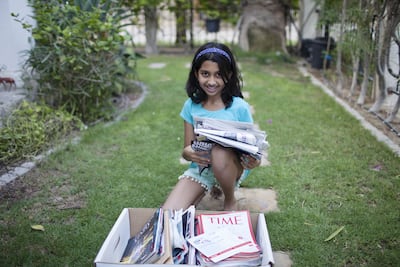
She may be only 16, but Sagarika Sriram has already received global attention for her environmental initiatives. Her involvement began when she was 10 and started hearing about the damage caused by plastic to the environment.
“We started seeing videos of whales washing up with plastic in their bellies or turtles choking on straws," Sagarika tells The National. "At that time, I had just finished a Johns Hopkins course on web design and as a project had to create a website on anything I wanted. I decided to created k4bworld.com – Kids for a Better World."
The course ended soon after but the website, and the passion behind it, stuck. “I realised I wanted it to be bigger," Sagarika says. "I wanted to get others my age involved too,”
She started clean-up drives, going door to door around her community, collecting recyclable waste and getting people to sign up for her website where she regularly posts about planting seeds and trees, recycling and other initiatives. It was not long before she gained recognition, including from the UN Environment Programme, which called her “an inspiration to all young girls in her country and West Asia”.
In the UAE, Sagarika has worked with Emirates Environmental Group, which she says gave her all the information she needed.
She has also worked with Day for Dubai, an initiative that invites people to spend one day of the year helping those in need.
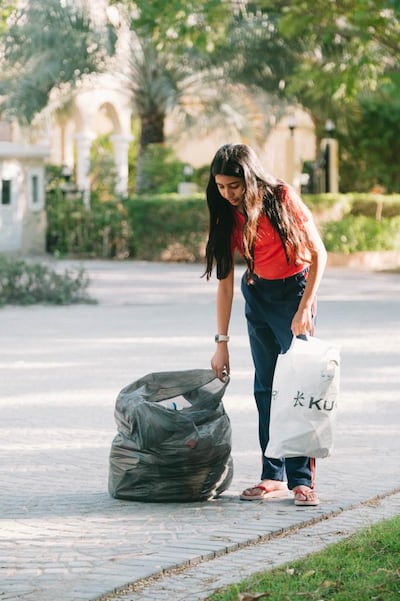
“The UAE has been incredibly supportive. People have helped to expand my project and my website to make it what it is now.”
The platform draws about 99,000 annual visitors. Even during the pandemic, Sagarika ensured her website was active, running Trash to Treasure, an online project to teach younger children how to recycle products around the house.
She says there’s still a long way to go. “At the end of the day, we are the future generation. In 30 to 40 years, this planet will belong to us, and we are not privileged enough to be in a situation where we can just let things be.
“It’s our job to protect it.”
Small tips that can be effective: "Home gardening," says Sagarika. "Plant a couple of seeds. Not only do you get fresh produce, but you also eliminate the time and effort spent going to the supermarket, and therefore reduce your carbon footprint."
Kehkashan Basu
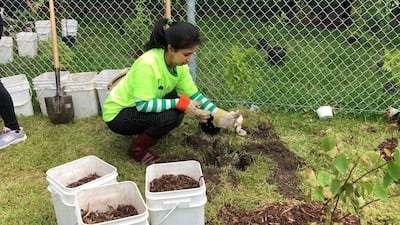
At 21, Kehkashan Basu has done more for the planet than many will be able to in a lifetime. Basu, who was born and raised in Dubai, launched the Green Hope Foundation when she was 12, and has expanded it to 25 chapters over the past nine years, including when she was a student in Canada.
It all started when she was just 7 and saw an image of a dead bird with a stomach full of plastic.
“At the time, environmentalist Robert Swan was having a lecture series in Dubai, which I attended. And he said something that just stuck. It was: ‘The greatest threat to our plant is the belief that someone else will save it’,” she recalls.
A seed was planted, quite literally. When she turned 8 that year, Basu celebrated by planting a tree. She then started working on the ground level in the UAE, mostly by spreading awareness around the community by visiting local restaurants and asking them if they could reduce their plastic use and collecting anything that could be recycled. She also spoke to beauty salons about reducing water waste and using organic products.
Her initiatives led to her being elected by the UN Environmental Programme’s global co-ordinator for children and youths when she was 12. It also gave her the courage to launch Green Hope in 2012, which raises environmental awareness among youngsters.
Basu says one of the reasons behind the launch was to ensure children and young people “have the education about our world’s greatest challenges so that they can take action to mitigate them”.
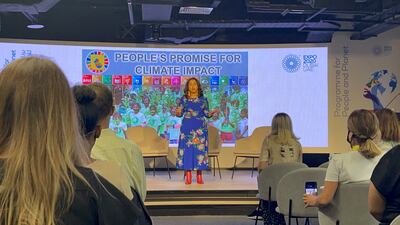
“I’ve always said that age has nothing to do with capability. Youngsters are often dismissed and told that they need to grow up to learn about the environment, and that's not true. If you instil an interest in sustainable development from a young age, just like you do for science or maths, youngsters can grow up with that knowledge and then expand on that.”
This is what Basu did. Over the years, Green Hope Foundation has been part of several environmental initiatives. In the UAE, it has worked with Dubai's education regulator, the Knowledge and Human Development Authority, and the emirate's municipality on tree-planting projects at Dubai Festival City, and for mangrove conservation.
Basu says that over the years, the mindset towards children taking an interest in the environment has changed greatly. “From my personal experience, I saw that shift happening much earlier in the UAE than globally ... that’s what kept me motivated,” she says.
Basu was back in the UAE for Expo 2020 Dubai’s Climate and Biodiversity Week this month, and delivered a talk on climate justice and "how people can expand their spirit of influence through ground-level actions”.
She says she was thrilled by the global fair. “It’s just a wonderful way of bringing everyone together, to start a dialogue that turns into action.”
Small tips that can be effective: "Educate yourself, your family, your community, and see what changes you can bring about at home," says Basu.
Assem Badreddine and Robert Andonian
Assem Badreddine, 18, and Robert Andonian, 17, no longer go to the same school, but one of the things the childhood friends still have in common is a passion for the environment. So, when they noticed small issues around their community – be it pollution or speeding – they wanted to find ways to solve them.
That is what led to the launch last year of Brighter 11, which they describe as an organisation with the core objective of making the Dubai community a better place. One of their first initiatives was a beach clean-up. The two started looking for students who would be willing to pitch in and were amazed by the result.
“We could only have about 30 students per clean-up and there was such high demand that we couldn’t accommodate everyone texting us. We had to organise more clean-ups in the coming weeks,” says Assem.
Between December 2020 and January 2021, the two organised six clean-ups. They have also launched other initiatives, such as marathons, that have funded food for workers at labour camps.
They hope to have more beach-cleaning sessions this winter, and even organise scuba diving clean-ups in the future.
“I’ve always wanted to do something to help others, the environment,” Assem says. While he applauds initiatives launched in schools to get youngsters more involved with environmental programmes, he says a shift in mindset is still needed worldwide.
“I’m an ardent believer of the fact that we are the last generation to be able to save the world, and [many in] our generation do not acknowledge this," he says.
"Many have objectives like becoming doctors or bankers, but the environment is not really their concern. I feel like we need to put in more effort to incentivise people to battle environmental issues.”
How can people do their part? “To begin with, people need to start caring more,” Robert says. “It should come from within. That’s how it works. Because no matter what anyone says, if you don’t truly want to do it, then it won’t happen.”
Small tips that can be effective: "Use technology to your advantage. If you’re on social media, follow profiles such as Greta Thunberg’s, CNN Climate and Green Harvard as they have good tips and information."
